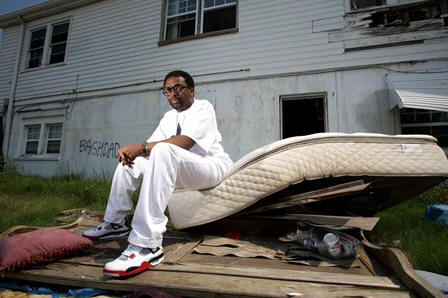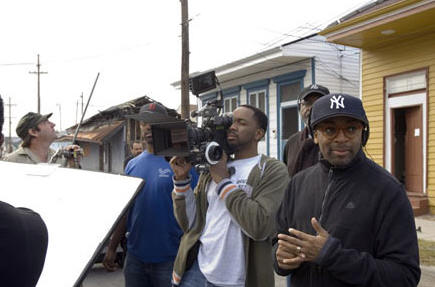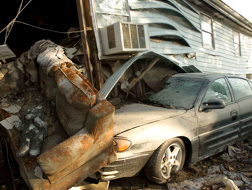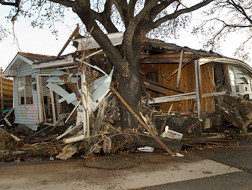Copyright ©2006 PopEntertainment.com. All rights reserved.
Posted:
December 18, 2006.
Spike
Lee has experienced many things in the twenty years since he exploded out of
NYU with She’s Gotta Have It and Do the Right Thing. His films
have looked unflinchingly at some of the most polarizing subjects of modern
life; race relations, drug abuse, inner city violence, religion, war
profiteering, politics, prison, the sex trade, organized crime – the list goes on and on.
However,
nothing could prepare Lee for the real life devastation which would blow
into the Gulf Coast in late August of 2005. Hurricane Katrina – as well as
political incompetence and poor planning – was essentially responsible for
wiping New Orleans, Louisiana, one of the most vital cultural areas in the
world, off of the map. Almost 2,000 people were killed. Untold billions of
dollars of property damage was rained down on the mostly impoverished people
of the area.
Lee had
a love for New Orleans and watched horrified by the news emanating from the
area. He had many friends from the district – including his long-time musical
collaborator Terence Blanchard. He saw vital stories that were not getting
told as lifelong residents had their whole lives destroyed. Families were
separated. People were herded into the Superdome and forced to live without
electricity, food or plumbing like animals. Bodies are still being found a
year later and entire neighborhoods are in rubble.
Therefore, Lee approached HBO about making a documentary on the Katrina
Disaster, which focused not just on the storm and the destruction, but the
people who survived it – and those who didn’t. The film which resulted was
When the Levees Broke: A Requiem in Four Acts, which examined the
devastation and the courage of the people of New Orleans for over four hours.
Now that it is being released on DVD, Lee has added an additional
two hours of footage to make the story even closer to complete.
“The one
thing that was surprising me going in,” Lee says, “[is] I didn't think there
would be as much humor as there ended up being. But we just successfully
captured the spirit of people. It was one of those things that I have to
laugh to keep from crying. Some said they were still crying despite the
laughing.”
It would
be nice and easy to blame the destruction of Katrina on Mother Nature run
amuck, but sadly that would be way too simple.
 “This
whole thing about if a category five hit New Orleans,” Lee says. “There have
been many studies, as you saw in the film, of what would happen – not that
many people paid heed to it. In reality, Katrina missed New Orleans. It was
only a category three. So, it was the breach of the levees that brought
about the destruction. Anybody who had been Mayor should have really been
working on the levee system. Because people knew throughout that it was
faulty. Even today it's still faulty. Thank God hurricane season is about to
end in a couple of weeks, because they got through. But they might not, you
know. It's like rolling dice. They keep thinking they are going to dodge a
bullet.”
“This
whole thing about if a category five hit New Orleans,” Lee says. “There have
been many studies, as you saw in the film, of what would happen – not that
many people paid heed to it. In reality, Katrina missed New Orleans. It was
only a category three. So, it was the breach of the levees that brought
about the destruction. Anybody who had been Mayor should have really been
working on the levee system. Because people knew throughout that it was
faulty. Even today it's still faulty. Thank God hurricane season is about to
end in a couple of weeks, because they got through. But they might not, you
know. It's like rolling dice. They keep thinking they are going to dodge a
bullet.”
When the
Levees Broke
is highly critical of the Government response to Katrina –
George W. Bush’s stated
belief that “Brownie’s doing a great job,” Condoleezza Rice’s buying
expensive shoes and going to plays in New York while the levees poured water
into the Ninth Ward, First mother Barbara Bush looking around at refugees
huddled in a Texas stadium and stating that because they were poor anyway,
they may be making out well by being relocated.
In fact,
despite the fact that most political pundits suggested that the recent
Democratic party sweep of the House of Representatives and the Senate was
mostly due to a public outcry about Iraq and the Mark Foley page scandal,
Lee feels that the storms also played a huge part in shaping public
opinion.
“I think
[Katrina] played a very big part of it,” Lee says. “I made that same
observation that people are coming out with these statements. They totally
left Katrina out of it. But I think it was the double whammy. Really I think
more than Mark Foley, [it was] Katrina and Iraq. That's what turned the
tide.”
When the
Levees Broke
received
some criticism in conservative circles for a section in which several of the
New Orleans residents suggest that the levees were blown up purposely. They
suggested that the explosion assured that the poor neighborhoods be damaged
and not the rich developments further down. However, Lee took no
side on the issue. The film also showed people who were quite sure
that this was just a conspiracy theory.
Many
people assailed Lee personally for taking on such a controversial topic – a
topic which the government would find embarrassing. However, Lee was not
worried about criticism or backlash.
 “I don’t
think it was a big risk doing a film like this,” Lee says. “What's the risk?
People can have their opinion, but I didn't see any risk involved. Never
thought about it.
“I don’t
think it was a big risk doing a film like this,” Lee says. “What's the risk?
People can have their opinion, but I didn't see any risk involved. Never
thought about it.
“I don't
really worry about that stuff. If I worried about that stuff then we
wouldn't have been able to build up the body of work that we've done. We've
done twenty films in twenty years so I've been too busy to worry about that
stuff.”
It is
not at all a partisan issue, though. Lee received the full cooperation of
New Orleans mayor Ray Nagin and Louisiana Governor Katherine Blanco (both of
whom are Democrats) in the filming. However, he will not give them a pass
for the destruction and the continued lack of progress, either.
“Whatever [Nagin is doing], it's not working,” Lee states. “Whatever
Blanco's doing, it's not working. Whatever Bush and the federal
administration are doing is not working. All this money that's been promised
has not reached into the people's hands. So we’re stuck somewhere.”
Lee is
trying to help in any way that he can to get money to the real victims. They
will get a percentage of the proceeds from the DVD. “That's something that
HBO is going to do for the people who appeared in the film,” Lee says. He
has also donated his own money, though he is not sure exactly how much.
“I'll have to check my tax records for that.”
Perhaps
most importantly, he was able to put human faces on the devastation. When
the Levees Broke speaks with dozens of people whose lives were altered
by events and aftermath of the storm. Some of the people spoken to were
directly involved in the management of the crisis. More were just
the normal
people who were swept up in abnormal events. Lee and his crew wanted to
capture as many typical New Orleans residents as they could.
“The
majority were found by Judy Aley, who was a researcher. She went down before
me and just walked around and walked up to people and asked them their
story.”
Through
this, Lee found that he had tapped into a rich
tapestry of life during and after Katrina.
“We
didn't have a script, so we had to find the structure. I had a great editor
– supervising editor and co-producer Sam Pollard. He went through hundreds
and hundreds of hours of footage. Not only of interviews [that] I conducted,
but the archival footage, the newsreel footage. Footage we got from citizens
of New Orleans who shot stuff on their own cameras.
 “We
wanted to take the best material,” Lee continues. “Shape it. Give it a
narrative. Tell a story. So, the release of the DVD is a three-disk and the
extras… one of the extra things is act five, which is an additional hour and
45 minutes of footage that was not in the original four hours… This is six
hours. With the addition of act five it’s now six hours and still
incomplete.
“We
wanted to take the best material,” Lee continues. “Shape it. Give it a
narrative. Tell a story. So, the release of the DVD is a three-disk and the
extras… one of the extra things is act five, which is an additional hour and
45 minutes of footage that was not in the original four hours… This is six
hours. With the addition of act five it’s now six hours and still
incomplete.
“The
film is incomplete because what’s happened down there is incomplete. So I
would like to stay with this – maybe come back in another year or so – and
try to do another look at it. Two, three years looking back. And how much
has changed. Or has not changed. It will be interesting to see where people
are in two or three years. Whatever happened to Phyllis Montana LeBlanc?
She’s in a FEMA trailer. Will she be in a FEMA trailer two or three years
from now? [Other people are] in Texas. How many people are going to move
back from the 46 other states? And what are they moving back to?”
Lee has
stayed in contact with many of the subjects of When the Levee Broke.
“I'm in touch with a lot of people. They're still struggling. It's still a
daily struggle just to get by.”
Of
course it would be impossible to look at Katrina and its aftermath without
looking at the crime as well, the looting and the continuing violence in the
city. Also, there is a lack of justice, because the judiciary system has
become cracked.
“There
were many people who were arrested or in jail prior to the breech of
levees,” Lee muses. “Some are still in jail now because records got lost and
the whole judicial system is messed up. Records are lost. People don’t know
who's in for what. It’s chaos. A lot of lawyers and DAs and stuff like that
left. The whole infrastructure of the city is gone.”
However,
there was joy within the sorrow as well. Lee and his crew went back down to
New Orleans for Mardi Gras and filmed the city trying to reclaim its spirit
and vibrancy after a crushing blow. It would seem bittersweet, but for a
short time people were able to forget.
“It
wasn't bittersweet at all,” Lee says enthusiastically. “It was fun.
Everybody was having fun. People understood that the world was going to
change the next day when they woke up, but for the moment people were having
fun. A lot of people who were evacuated had come back for homecomings. So
people would see a lot of friends and family who are living elsewhere.”
 New
Orleans is taking baby steps in getting back to its feet. Recently, a major
film was shot there – but Lee recognizes while that may help the local
economy it does not filter down to the average people.
New
Orleans is taking baby steps in getting back to its feet. Recently, a major
film was shot there – but Lee recognizes while that may help the local
economy it does not filter down to the average people.
“That's
not going to get to the regular folks,” Lee says. “The
fact that
Déjŕ
Vu
was shot in New Orleans did not impact the pocketbook of Phyllis or Kim
Polk.”
In fact,
Lee is a little disappointed in the artistic community in general and the
hip hop community more specifically; that such a vibrant artistic city could
be devastated and not many people tried to help. After Kanye West’s famous
live television statement that Bush did not care about black people, not
enough people were willing to demand to be heard.
“There
were several benefit concerts,” Lee says. “Stuff like that. I know Jay-Z has
a song on his new, upcoming album that’s about how the United States
deserted the citizens of the Gulf region. But very, very few people stood
up. It was disappointing more people didn't stand up.”
However,
it is also important to keep getting the word out. Lee is making a new
TV series on the subject for NBC – a fictional look at the survivors of the
storm.
“We are
in development,” Lee says. “It's called Nola, and it takes place in
post-Katrina, post-levee-breached New Orleans. Like today, people just
trying to put their lives back together.”
Perhaps
the most important thing that Lee can do is remind the people what happened.
Keep the horror fresh in everybody’s minds so that a disaster like Katrina
could never happen again. Those who don’t learn from history are doomed to
repeat it. It’s an uphill battle, Lee knows, in the
attention-span-challenged modern world.
“Definitely people have forgotten what happened in New Orleans,” Lee says.
“The other group thinks that much progress has been done because they bought
into the photo-ops of Bush when he went down there for the anniversary. The
reopening of the Superdome and the Saints [are] winning. They see a bunch of
people in the French Quarter [and] think everything is back to business. That's
not the case.”
CLICK HERE
TO SEE WHAT SPIKE LEE HAD TO SAY TO US ABOUT RED HOOK SUMMER IN 2012!
CLICK HERE TO
SEE WHAT ACTOR WENDELL PIERCE HAD TO SAY TO US ABOUT HURRICANE KATRINA IN
2011!
Features
Return to the features page




